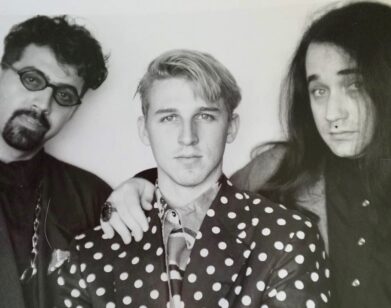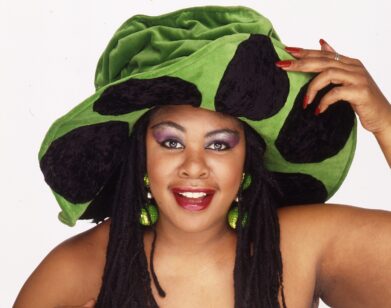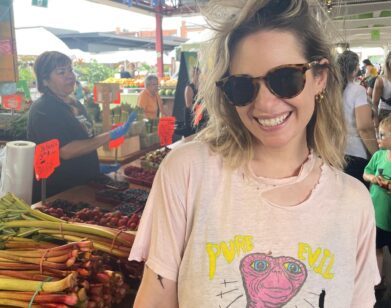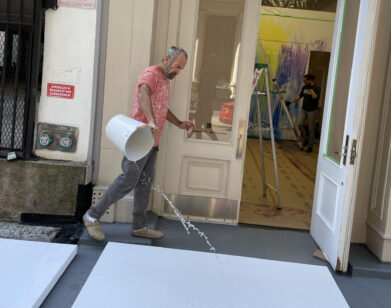Annie Baker, Sam Gold, and Uncle Vanya’s Beige Socks
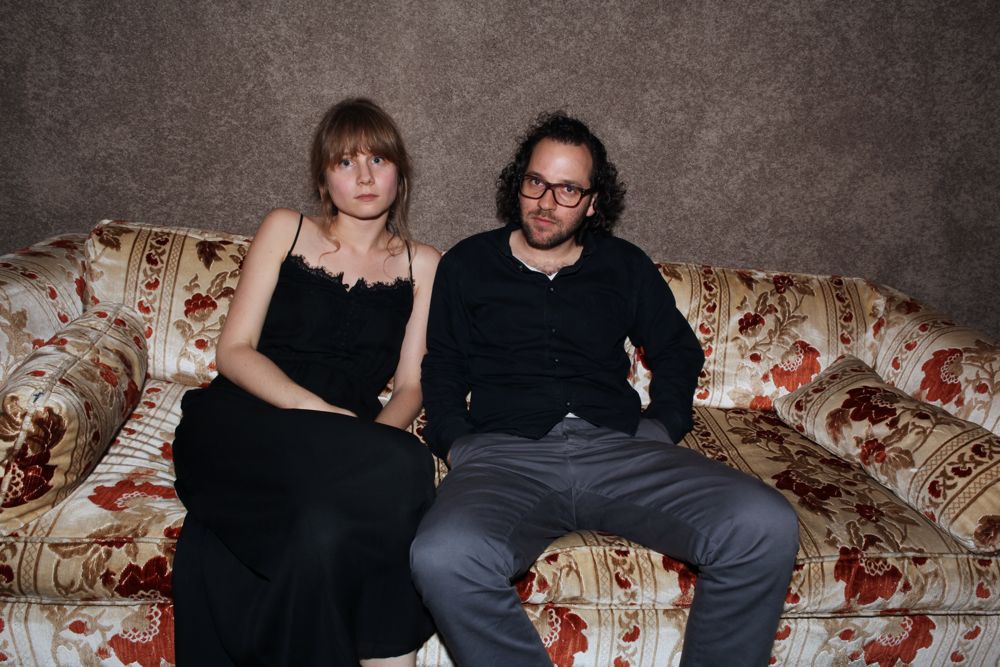
ABOVE: ANNIE BAKER AND SAM GOLD. PHOTO COURTESY OF JULIETA CERVANTES.
Sitting in the Soho Rep Theater, watching a rehearsal for Sam Gold and Annie Baker’s new adaptation of Anton Chekhov’s Uncle Vanya, it is difficult not to feel envious of the cast and their camaraderie. Two actors, Merritt Wever and Maria Dazia, sit on stage—to the extent that there is a stage—running their scene. Director Sam Gold, who recently directed the Broadway hit Seminar, lies about two feet away from them, with playwright Annie Baker and the rest of the cast perched along the sides. Notes turn into anecdotes about Gold’s new baby and general laughter. You feel as if you are amongst a group of college friends, albeit one with a 50-year age range.
Uncle Vanya is Sam and Annie’s third professional collaboration—Sam also directed two of Annie’s original plays, Circle Mirror Transformation [2009] and The Aliens [2010]. They’ve assembled an impressive cast which includes Michael Shannon, Peter Friedman, Matthew Mahur, Rebecca Schull, Paul Thureen, and Reed Birney—who also starred in Circle Mirror—as Uncle Vanya.
EMMA BROWN: I know you’ve worked on other plays before, but how long have you two known each other?
SAM GOLD: How many years is it now?
ANNIE BAKER: It’s five or six. We met the year you started dating Amy [Herzog].
GOLD: We met through a few other playwright friends that we have in common. Annie was in a writers’ group with two other writers who are close friends of mine, one of whom I started dating. It was really through my now-wife, who thought that we would get along and thought we should work together.
BROWN: And how did the idea of an Uncle Vanya adaptation come about?
BAKER: When were at the Sundance [Institute] Theater Lab together [in 2008]—which was the first summer we worked together, actually—we read Uncle Vanya out loud. We were working with Reed [Birney] that summer and I think we were really excited by the idea…
GOLD: Of him playing the part. It sort of morphed from a fun fantasy reality into a reality over a long period of time. Once we got to production with [Annie’s play …] we kept mentioning it to Reed, “Oh, you’d be such a great Uncle Vanya.” It was almost a joke at first, “Annie will translate it and that’ll be so fun!” [But then] we were in the elevator at Playwrights Horizons one day and Annie was like, “I actually think I may want to go to Russia and research this, actually write the translation.” We started thinking where we’d want to do it if we really did a production and we thought of Soho Rep [Theatre] and approached Sarah. It became a reality when people seemed to want to do it.
BROWN: And why did you pick the Soho Rep?
BAKER: It is really small space, very intimate, and [we] wanted to make sure we weren’t in the situation where a theater was looking for a super seminal production-level Vanya, [because] we felt like we would disappoint. [The Soho Rep] was really interested in what we wanted to do with the play, we felt like they got it.
GOLD: This theater is 75 feet. Once you start getting into a theater larger than that, there are just practical limitations to what you can do to the space, and to the experience. You can’t remove every theater seat out of a theater; you start getting into a lot of really boring limitations. We just wanted to work somewhere that didn’t have limitations; it could be really intimate and be really, really close quarters where we could control everything about the experience. Soho Rep had a reputation for allowing the artist to take over the space and do something different there. The space has a lot to do with it.
BROWN: Do you come to every rehearsal, Annie?
BAKER: I have come to most rehearsals; I’ve missed a few because I had to go to costume stuff.
BROWN: I read a writer say that he didn’t like to attend rehearsals of his plays, because everyone thought of him as an absolute authority on the text, and would ask him questions and it was just his interpretation. Do you ever feel like that?
BAKER: With my own plays, I feel like I am the person who knows, maybe to a fault. [laughs] With this play, I don’t—no one in the cast thinks I know all the answers. The act of translation and adaptation is mixed in some ways, I almost feel like people don’t even realize how much I’ve [interpreted].
GOLD: It’s a hazy line between what decisions Annie made and what decisions Chekhov made.
BAKER: And the actors can’t know, because they don’t know the original Russian text, so it would actually make no sense for them to turn to me and ask, “What does this mean?” I feel like everybody’s weighing in—I’m weighing in, Sam’s weighing in, the actors are weighing in, the designers are—we all know the text and have all seen many productions of it. It’s been an amazing group collaboration figuring out what the play needs. There is no ultimate authority; Sam’s directing it, but no one is like “I know what Uncle Vanya means.”
GOLD: It’s that dream you have about collaboration; that’s why you do it, to get in a room with a bunch of people you trust and make something with them. If there is a really good answer as to why we did [another adaptation of Uncle Vanya], it’s is because we knew that Reed, all the actors, and the design team would be really game to sit around and pull out their hair trying to figure out how to tell the story. That is a very different experience than working on a new play, where you, as a team, are responsible for the way people are going to see somebody’s private work. There’s a certain kind of pressure involved [and] doing Chekhov has nothing to do with that kind of pressure; Chekhov’s been dead so long, his work has been massacred so many times, he rolled over in his grave years ago. We have nothing to worry about him; we just have to worry about our connection to each other and how we want to tell the story.
BROWN: Tell me about the first day of rehearsal, what did you do?
BAKER: Sam had a baby!
BROWN: Oh my! Congratulations.
GOLD: My wife went into labor on the first day of rehearsal. It was a fairly dramatic day; we all got together, the whole company and everyone from Soho Rep jam packed into this little room. The first day rehearsal in the theater almost always starts with a meet-and-greet and a design presentation; everyone has coffee and shakes hands and kibitzes for a little while, and then the director explains their thoughts on the production to the team and the designers sometimes weigh in. It’s sort of a way of getting everybody on the same page. I did that, I talked for half an hour about my vision for Uncle Vanya. Then I walked out of the door and went to the hospital and had a child.
BROWN: Did you feel very out of the loop when you returned to rehearsals?
GOLD: I didn’t feel out of the loop; but I didn’t know really where the hell I was or what I was doing. To go from rehearsal to the hospital and then back to rehearsal was just like the Twilight Zone. But I think it’s also kind of amazing; I brought my kid to tech on Sunday and she hung out for a few hours while I gave notes. I definitely feel like, if I was ever going to have a play that will get remembered as the play I was doing when I had my kid, I’m really glad it’s this one.
BAKER: The cast has all been very invested with the baby, there’s lots of ooh-ing and aah-ing, getting to see photos every day.
GOLD: A good bonding activity.
BROWN: Annie, you mentioned you are working on the costumes for this play. Have you worked on theater costumes before?
BAKER: That also sort of started as a pseudo-joke.
GOLD: I feel like that started brewing in The Aliens.
BAKER: Really?
GOLD: I noticed Annie was really good at talking about clothes and really specific about how she thought a character should be dressed when we were doing The Aliens. On The Aliens, you got really involved; I was like, “Oh, I can see you wanting to do this for your own play.”
BAKER: Funny that I’m doing it for a Chekhov play and not my own play. It was a big job; I write plays with, like, three-person casts and this is a four-act, nine character. It was bigger than I thought it was going to be. [But] I think one benefit of me being the costume designer is, because I was at rehearsal almost every day, I took notes on what the actors were wearing, and a lot of what they’re wearing in the show is inspired by what they wear in real life. It’s a mixture of the character and the actor.
BROWN: What about the play has been keeping you up at night?
BAKER: I guess I’m up late at night wondering what color socks people should wear.
BROWN: What color socks does Vanya wear?
BAKER: White in the first half of the play and beige in the second. Stuff like that.
BROWN: I’d heard that you were basing the costumes on “current-day Russia,” but it doesn’t seem like that is the case.
BAKER: We’ve had so many conversations about the design and the tone of the production, probably at some meeting the idea of present-day Russia was voted [on] and that was something we decided not to do, we pointedly were not doing that.
GOLD: We’ve not adapted the play to take place in a different time and place than the author intended. I think that our desire to do this play does not come from an angle, and I think perhaps the desire is [for us] to have an angle. We’ve been really [careful] about the way people talk about the play, because it really affects the audience if [they] come in with some kind of angle in their head about how why they’re here, why we did it, “This is ‘blank’ Uncle Vanya.” We’re both very controlling people, so it feels really scary that there can wind up being some kind of way that the audience perceives this, that didn’t come from us. I think the American theater tradition is fairly narrow in how it thinks about the act of translation of the old texts and their reproductions, there’s a lot of convention about how an old play allowed to be staged in a contemporary setting. I don’t know why productions of Chekhov plays often have a similar look or a similar approach, when the play is 100 years old and there should be a million different ways to approach it.
BAKER: I feel like, from my experience of seeing Chekhov plays, there’s either the 19th-century, corset version, spoken in pseudo-British accents, or there’s the “updating” of it where [the characters] live in Cleveland, in 1982. [Our production] is not in the 19th century, but it’s not-not in the 19th century, either. I didn’t update any of the references, my adaptation is very literal. I didn’t have to do anything to it; if you just literally translate exactly what [Chekhov] wrote, it sounds super contemporary.
GOLD: I think we’re trying to be evocative; we’re trying to pull everyone in the room and do as minimal a job of interpretation as possible, so the interpretation happens in the minds of the audience. People are wearing contemporary clothing [in our production], but the reason they’re wearing contemporary clothing is not because we’re setting it in contemporary America, it’s because to me, neutral is contemporary clothing. They are, from the comfort of the clothes they wear in real life, telling the story of Uncle Vanya and evoking in your imagination the world of the play. If you were going to sit around and read the play, you wouldn’t think about the period, you would focus on hearing the play.
BROWN: Has this inspired you to translate and adapt other plays?
BAKER: There’s one other Chekhov play I’m really interested in adapting and translating at some point in my life, Ivanov, but I think I want to wait until I’m, like, 45. There’s no shortage of Chekhov adaptations; I did have a crisis like a year ago where I said, “Why am I contributing another Uncle Vanya to the already enormous stack of Uncle Vanyas in the world?” [But] I actually ended up feeling really good about it; through the translation/adaption process I realized how completely different mine is from any of the others, and how different they are from each other, and how none of us are actually hitting upon the original. The more translations there are, the closer we’ll get to communicating the original to audiences.
BROWN: Are you going to have a talkback session with the audience?
GOLD: It’s nice to evoke things, but it’s not always nice to know what people think.
BROWN: And what are you both up to after this?
BAKER: I am working on a rewrite of a new play that is opening in January of 2013, and Sam is directing it. I plan to do a major rewrite this summer.
GOLD: I’m playing with my baby and I’m going to be developing a musical this summer—Jeanine Tesori and Lisa Kron’s musical adaptation of the graphic memoir of Fun Home [by Alison Bechdel].
UNCLE VANYA IS PLAYING AT THE SOHO REP THEATER IN NEW YORK UNTIL JULY 15TH. TO PURCHASE TICKETS, OR FOR MORE INFORMATION, VISIT THE SOHO REPERTOIRE WEBSITE.

